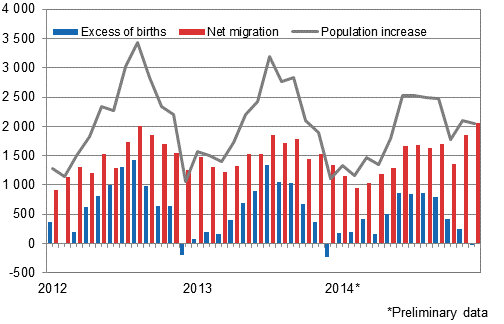Published: 27 January 2015
Seventy-six per cent of population growth in 2014 was net immigration
According to Statistics Finland's preliminary data, 76 per cent of Finland's population growth consisted of net immigration in 2014. Over the year, the population grew by 23,020 persons, which was 1,690 persons fewer than in 2013. The share of net immigration in the population growth was 17,540 persons. Natural population increase, or excess of births to deaths, was 5,480 persons. The preliminary population figure at the end of 2014 was 5,474,289.
Population increase by month 2012–2014*

According to the preliminary statistics for 2014, altogether 31,950 persons immigrated to Finland from abroad and 14,410 persons emigrated from Finland. The number of immigrants was the same as in 2013. The number of emigrants was, in turn, 520 higher than in the previous year. In all, 8,780 of the immigrants and 9,890 of the emigrants were Finnish citizens.
The number of births fell for the fourth year in a row. During 2014, a total of 57,080 children were born, which was 1,060 fewer than in 2013. The number of deaths was 51,600, which is 120 higher than one year earlier.
According to the preliminary data, the number of inter-municipal migrations totalled 266,020 in 2014. Compared with the previous year, the decrease was 1,180 migrations according to the municipal division of 2014.
According to preliminary data by region, the population grew in the following regions in 2014: Uusimaa, Pirkanmaa, North Ostrobothnia, Varsinais-Suomi, Ostrobothnia, Åland, Central Ostrobothnia and Central Finland. In Pohjois-Savo, the population remained almost unchanged.
During 2014, the population grew most in absolute numbers in Uusimaa, where it went up by 19,290 persons. The next largest increase in population was seen in Pirkanmaa, 3,410 persons. Relative to the population, population increase was highest in Uusimaa, 12.1 per mil. Relative population growth was second highest in Åland, 8.9 per mil and third highest in Pirkanmaa, 6.8 per mil. Population loss was highest in absolute numbers in the region of Etelä-Savo that lost 900 persons of its population. The population of Kymenlaakso decreased by 890 persons, which was the second biggest population loss. Relative to the population, the biggest population loss was found in Kainuu, 9.0 per mil and the second biggest in Etelä-Savo, 5.9 per mil.
Most migration gain from intramunicipal and international migration was collected by Uusimaa, 12,790 persons and Pirkanmaa, 2,690 persons. Most migration gain in relative terms was attained by Uusimaa, 8.0 per mil and by Åland, 7.7 per mil.
In absolute numbers, migration loss from total net migration was biggest in the region of Lapland, 500 persons, and in the region of Kainuu, 460 persons. In relative terms, the biggest migration loss from total net migration was found in the region of Kainuu, 5.7 per mil of the population.
During 2014, migration between regions numbered 124,220. The highest gain from migration between regions was seen in Uusimaa, Pirkanmaa, Varsinais-Suomi, Pohjois-Savo and Åland. In absolute numbers, the highest gain from migration between regions was received by Uusimaa, 4,720 persons and Pirkanmaa, 1,800 persons. However, relative migration gain was highest in Pirkanmaa, 3.6 per mil and second highest in Uusimaa, 3.0 per mil of the population.
Migration loss from migration between regions was biggest in absolute numbers in the region of Kymenlaakso, 980 persons and in relative terms in the region of Kainuu, 8.4 per mil of the population.
Source: Population Statistics, Statistics Finland
Inquiries: Marja-Liisa Helminen 029 551 3273, Matti Saari 029 551 3401
Director in charge: Riitta Harala
Publication in pdf-format (320.2 kB)
- Tables
-
Tables in databases
Pick the data you need into tables, view the data as graphs, or download the data for your use.
Appendix tables
- Appendix table 1. Preliminary data on vital statistics by month of occurence 2014 (27.1.2015)
- Appendix table 2. Vital statistics, final data 2005 - 2013 and preliminary data 2014 (27.1.2015)
- Appendix table 3. Comparison between preliminary vital statistics in 2014 and 2013 (27.1.2015)
- Appendix table 4. Preliminary vital statistics by region 2014 and change compared to 2013 final data, quarters 1 - 4 (27.1.2015)
- Appendix table 5. Preliminary data by region on immigrants and emigrants according to country of departure/destination 2014, quarters 1 - 4 (27.1.2015)
- Figures
-
- Appendix figure 1. Live births by quarter 1994 - 2013 and preliminary data 2014 (27.1.2015)
- Appendix figure 2. Deaths by quarter 1994 - 2013 and preliminary data 2014 (27.1.2015)
- Appendix figure 3. Intermunicipal migration by quarter 1994 - 2013 and preliminary data 2014 (27.1.2015)
- Appendix figure 4. Immigration by quarter 1994 - 2013 and preliminary data 2014 (27.1.2015)
- Appendix figure 5. Emigration by quarter 1994 - 2013 and preliminary data 2014 (27.1.2015)
Updated 27.01.2015
Official Statistics of Finland (OSF):
Preliminary population statistics [e-publication].
ISSN=2243-3627. December 2014. Helsinki: Statistics Finland [referred: 4.3.2026].
Access method: http://stat.fi/til/vamuu/2014/12/vamuu_2014_12_2015-01-27_tie_001_en.html

